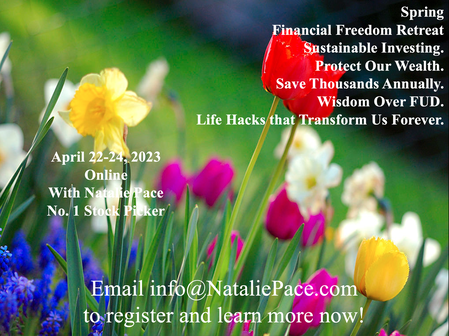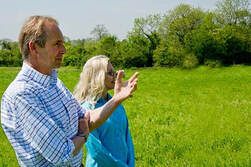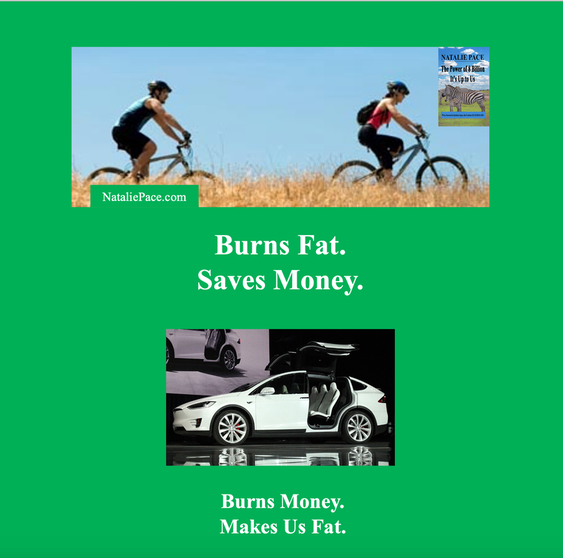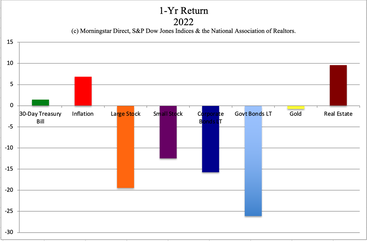|
The Highest Yielding Bonds in 2023. Rethinking ROI. In today’s world, when a lot of the perceived “safe” investments are losing money, is the best Return on Investment (ROI) found in overlooked places? As you can see below, with long-term government bonds losing -26% last year and the S&P500 down -19.44% in 2022, anyone seeking any dividend on a paper asset is at risk of losing a substantial amount of principal. (Read my blog on our 2023 Bond Strategy for ways to navigate this tricky environment.) Would it be more financially advantageous to just stop making everybody else rich at our own expense? Have we ever thought of yield in terms of the money we save when we eliminate bills? Below is a new way of thinking about wealth, where we emphasize keeping the money in the family. Imagine just how much money we would save if we stopped paying the landlord, the utility company, the gas station, the auto manufacturers, the health insurance company and the insurance salesmen, and started paying ourselves first. Below is the ROI on that strategy. Owning Your Own Home Let me preface this by saying that buying a home at the top of the market and having the value fall beneath the value of your mortgage is one of the worst investment hells anyone can endure. There are at least 10 points to consider before buying your own home that are outlined in the Real Estate section of The ABCs of Money, 5th edition. However, once all of these points line up, the purchase can be a powerful way to start building personal wealth – if we are buying a home we can afford, in a neighborhood we love, at a good price. Before making the purchase, it’s a good idea to consider ways that we might earn income from the property – to think bigger. Having rental income means that we can afford more, and that often equates to a better place with less cost per square foot. Should We Have an ADU* or Rent Out a Room? *Additional Dwelling Unit Most of the time, it’s a good idea to consider whether you might be able to get a bigger place and monetize it with some income. Having each family member living in their own tiny place is not very cost effective. Should you think about moving the parents into an ADU out back? Would your college grad benefit from renting out the basement for a few years to pay off student loan debt? Can you earn extra income by renting out a guest house? Anyone who considers being a landlord needs to know the basics on local rental laws, short-term rental policies, taxes and more. Before renting to a family member, you want to be sure that you have a high likelihood of getting paid. Rental income is a business, and there are considerations and details that must be addressed. However, under the right circumstances, passive rental income can be a great “money while you sleep” supplement to your hard-earned labor. I’ll be hosting a Real Estate Master Class in the fall. Email [email protected] if you’d like to be put on the wait list for this course. We also talk about real estate on the 3rd day of our Financial Freedom Retreats. Join us April 22-24, 2023 online. (Click for additional information, including pricing, hours, testimonials and the 15+ things you’ll learn and master.) Solar Panels Versus Making the Utility Company Rich If the average cost of solar for a well-insulated 2500 square foot home is under $20,000, then the yield on that purchase can be as high as 15%, with just 5-7 years to pay off the panels. See the math below. Solar panels = $18,000 U.S. tax credit (you may qualify for state or local credits, too) = 30% (-$5,400) Total Cost = $12,600 Monthly electric bill = $200 (typically reduced to under $50/month) = $1920/year in savings Time Period to Pay Off $12,600 = 6.56 years Yield on $12,600 investment after pay-off = 15.2% You’ll want to make sure that you plan to own your home for a few decades, and that you reduce your KW usage before the quote. Be sure to read, “How to Save Thousands on Your Electric Bill,” in The ABCs of Money, 5th edition, for essential tips on solar. A 15% yield on a safe, income-producing hard asset such as solar panels is beneficial for our budget and for the planet, as most utilities are still at least 60% powered with fossil fuels. Powering Your Electric Vehicle With Solar You’ll need more panels if you plan to power your EV. So, after you get your kilowatt usage down (with the tips outlined in The ABCs of Money, 5th edition), be sure to consider how much additional KW you’ll need to top off your EV. Even considering a higher cost for the panels, the savings and yield are likely to be even higher. Most of us spend $2000 or more each year on gasoline. That means our utility and gas bill could potentially drop from $4,400/year or more to $600 or less, putting the yield at over 25% on our investment (after the payback of the panels). Mass Transit and Micro Mobility Some people are saving $8,000 or more each year by jettisoning the car. The annual drain of our income toward a car payment, insurance, gasoline and maintenance is often thought of as a “bill,” rather than what that money could purchase that we might enjoy a lot more, like a great vacation. Should our next car be a bike? People in Amsterdam commute to work, school and play, even in the snow. It is one of the most bike-friendly cities in the world. A few years ago I interviewed Mayor Winterer (former Mayor of Santa Monica, California). His family of four had five bikes and one car. They bridge the gap with ride-sharing apps. He said, “In 2017, between my wife and I, we spent a little over $2000 on Uber and Lyft. That is so much less than the cost of owning a car.” If we’re working from home 2-3 days a week, would it be worth it to take mass transit instead of owning a car? $8,000 buys a lot of Uber rides to places we don’t want to (or can’t) bike to. Should we factor in the car savings when deciding between a job that will allow us to work-from-home and one that demands us to commute to the office every day? Health Savings Accounts Health savings accounts allow us to stop making the health insurance company rich, and start building up an impressive long-term health care retirement plan. HSAs work best if we are healthy and spending an arm and a leg on health insurance. Since the biggest cost in retirement is health care, having our own nest egg means that we can save a lot on supplemental health care insurance. Get additional information on HSAs at IRS.gov and in The ABCs of Money, 5th edition. Bottom Line Gasoline, utility bills, cars, housing and health care are all spiraling out of the range of affordability in today’s inflationary world. As consumers, we have to think outside the box in order to make our budgets add up. If we add in this new ROI investing angle, where we keep the money in the family and stop making everyone else rich at our own expense, we can protect our wealth and future, while also shielding ourselves from equity and fixed income losses. Email info @ NataliePace.com or call 310-430-2397 if you are interested in learning time-proven investing, budgeting, debt reduction, college prep and home buying solutions that will transform your life at our next Financial Freedom Retreat. We spend one full day on what's safe, helping you to protect your wealth and reduce money stress.  Join us for our Online Financial Freedom Retreat. April 22-24, 2023. Email [email protected] to learn more. Register with friends and family to receive the best price. Click for testimonials, pricing, hours & details.  Natalie Pace learning organic farming tips from David Wilson, the former Home Farm manager of The Duchy of Cornwall. Photo by Marie Commiskey. Natalie Pace learning organic farming tips from David Wilson, the former Home Farm manager of The Duchy of Cornwall. Photo by Marie Commiskey. Natalie Wynne Pace is an Advocate for Sustainability, Financial Literacy & Women's Empowerment. Natalie is the bestselling author of The Power of 8 Billion: It's Up to Us and is the co-creator of the Earth Gratitude Project. She has been ranked as a No. 1 stock picker, above over 835 A-list pundits, by an independent tracking agency (TipsTraders). Her book The ABCs of Money remained at or near the #1 Investing Basics e-book on Amazon for over 3 years (in its vertical), with over 120,000 downloads and a mean 5-star ranking. The 5th edition of The ABCs of Money was released on September 17, 2021. Natalie Pace's easy as a pie chart nest egg strategies earned gains in the last two recessions and have outperformed the bull markets in between. That is why her Investor Educational Retreats, books and private coaching are enthusiastically recommended by Nobel Prize winning economist Gary S. Becker, TD AMERITRADE chairman Joe Moglia, Kay Koplovitz and many Main Street investors who have transformed their lives using her Thrive Budget and investing strategies. Click to view a video testimonial from Nilo Bolden. Check out Natalie Pace's Apple Podcast. Watch videoconferences and webinars on Youtube. Other Blogs of Interest Are You Anxious or Depressed over Money? Why We Are Underweighting Banks and the Financial Industry. You Stream all the Channels. Should You Invest, Too? NASDAQ is Still Down -26%. Are Meta & Snap a Buy? 2023 Bond Strategy Emotions are Not Your Friend in Investing Investor IQ Test Investor IQ Test Answers Bonds Lost -26%, Silver Held Strong. 2023 Crystal Ball for Stocks, Bonds, Real Estate, Cannabis, Gold, Silver. Tilray: The Constellation Brands of Cannabis New Year, New Healthier You Tesla's $644 Billion Fall From Mars Silver's Quiet Rally. Free Holiday Gift. Stocking Stuffers Under $10. Cash Burn & Inflation Toasted the Plant-Based Protein Companies Save Thousands Annually With Smarter Energy Choices Is Your FDIC-Insured Cash Really Safe? Giving Tuesday Tips to Make Your Charitable Contribution a Triple Win. Is Your Pension Plan Stealing From You? The FTX Crypto Fall of a Billionaire (SBF). Crypto, Gold, Silver: Not So Safe Havens. Will Ted Lasso Save Christmas? 3Q will be Released This Thursday. Apple and the R Word. Yield is Back. But It's Tricky. The Real Reason Why OPEC Cut Oil Production. The Inflation Buster Budgeting and Investing Plan. No. Elon Musk Doesn't Live in a Boxabl. IRAs Offer More Freedom and Protection Than 401ks. Will There Be a Santa Rally 2022? What's Safe in a Debt World? Not Bonds. Will Your Favorite Chinese Company be Delisted? 75% of New Homeowners Have Buyer's Remorse Clean Energy Gets a Green Light from Congress. Fix Money Issues. Improve Your Relationships. 24% of House Sales Cancelled in the 2nd Quarter. 3 Things to Do Before July 28th. Recession Risks Rise + a Fairly Safe High-Yield Bond DAQO Doubles. Solar Shines. Which Company is Next in Line? Tesla Sales Disappoint. Asian EV Competition Heats Up. 10 Wealth Strategies of the Rich Copper Prices Plunge Colombia and Indonesia: Should You Invest? 10 Misleading Broker/Salesman Pitches. Why are Banks and Dividend Stocks Losing Money? ESG Investing: Missing the E. Bitcoin Crashes. Crypto, Gold and Stocks All Crash. The U.S. House Decriminalizes Cannabis Again. The Risk of Recession in 6 Charts. High Gas Prices How Will Russian Boycotts Effect U.S. Multinational Companies? Oil and Gas Trends During Wartime Russia Invades Ukraine. How Have Stocks Responded in Past Wars? 2022 Crystal Ball in Stocks, Real Estate, Crypto, Cannabis, Gold, Silver & More. Interview with the Chief Investment Strategist of Charles Schwab & Co., Inc. Stocks Enter a Correction Investor IQ Test Investor IQ Test Answers What's Safe in a Debt World? Money Market Funds, FDIC, SIPC: Are Any of Them Safe? My 24-Year-Old is Itching to Buy a Condo. Should I Help Him? The 12-Step Guide to Successful Investing. Gardeners Creating Sanctuary & Solutions in Food Deserts. The Bank Bail-in Plan on Your Dime. Rebalancing Your Nest Egg IQ Test. Answers to the Rebalancing Your Nest Egg IQ Test. Important Disclaimers Please note: Natalie Pace does not act or operate like a broker. She reports on financial news, and is one of the most trusted sources of financial literacy, education and forensic analysis in the world. Natalie Pace educates and informs individual investors to give investors a competitive edge in their personal decision-making. Any publicly traded companies or funds mentioned by Natalie Pace are not intended to be buy or sell recommendations. ALWAYS do your research and consult an experienced, reputable financial professional before buying or selling any security, and consider your long-term goals and strategies. Investors should NOT be all in on any asset class or individual stocks. Your retirement plan should reflect a diversified strategy, which has been designed with the assistance of a financial professional who is familiar with your goals, risk tolerance, tax needs and more. The "trading" portion of your portfolio should be a very small part of your investment strategy, and the amount of money you invest into individual companies should never be greater than your experience, wisdom, knowledge and patience. Information has been obtained from sources believed to be reliable. However, NataliePace.com does not warrant its completeness or accuracy. Opinions constitute our judgment as of the date of this publication and are subject to change without notice. This material is not intended as an offer or solicitation for the purchase or sale of any financial instrument. Securities, financial instruments or strategies mentioned herein may not be suitable for all investors. Comments are closed.
|
AuthorNatalie Pace is the co-creator of the Earth Gratitude Project and the author of The Power of 8 Billion: It's Up to Us, The ABCs of Money, The ABCs of Money for College, The Gratitude Game and Put Your Money Where Your Heart Is. She is a repeat guest & speaker on national news shows and stages. She has been ranked the No. 1 stock picker, above over 830 A-list pundits, by an independent tracking agency, and has been saving homes and nest eggs since 1999. Archives
July 2024
Categories |









 RSS Feed
RSS Feed